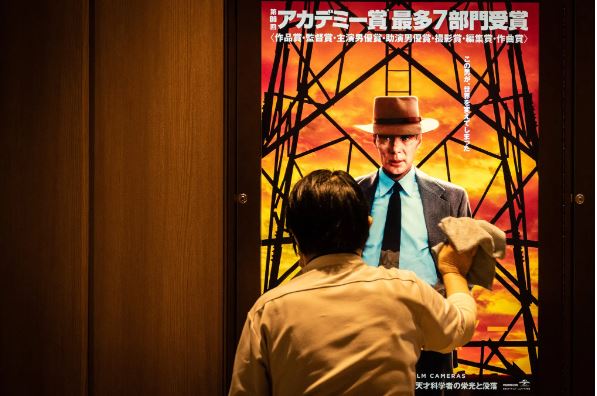The recent release of the Oscar-winning biopic “Oppenheimer” in Japan has stirred significant controversy and introspection among Japanese audiences. Directed by Christopher Nolan, the film portrays the life and work of J. Robert Oppenheimer, the scientist known as the father of the atomic bomb, and his team’s groundbreaking discoveries leading up to the United States’ devastating bombings of Hiroshima and Nagasaki during World War II.
For many Japanese viewers, watching the film has been a deeply unsettling experience. Kako Okuno, a 22-year-old nursery school teacher from Hiroshima, expressed shock at seeing scenes depicting American scientists celebrating the explosion over Hiroshima with jubilation. She lamented that the film failed to capture the harrowing experiences of the hundreds of thousands of atomic bomb victims in Hiroshima and Nagasaki, emphasizing the importance of understanding the full impact of nuclear warfare.
The decision by Bitters End, an indie Japanese distributor, to release “Oppenheimer” in theaters sparked controversy even before its premiere. Some prospective viewers expressed outrage over online memes that appeared to trivialize the atomic bombings, highlighting the sensitive nature of the subject matter. In response, some theaters in Japan have displayed trigger warnings, acknowledging the potential distress that certain scenes may evoke among audiences.
Despite these concerns, there are voices advocating for the film’s screening in Japan. Yasuko Onda, an editorial board member at The Yomiuri Shimbun, emphasized the importance of fostering an open dialogue and confronting challenging historical narratives. While acknowledging the film’s limitations in representing the full scope of the atomic bombings’ impact, Onda stressed the need for continued engagement and critical reflection.
Critics like Yujin Yaguchi, a professor of American studies at the University of Tokyo, pointed out the film’s narrow focus on a select group of white male scientists, highlighting the omission of other perspectives, such as those of Native Americans affected by nuclear testing. However, some viewers appreciated the film’s portrayal of Oppenheimer’s growing moral conscience and remorse as he grappled with the consequences of his scientific breakthrough.
The release of “Oppenheimer” in Japan comes at a time of evolving attitudes toward nuclear weapons and warfare. While the bombings of Hiroshima and Nagasaki were once viewed in the United States as necessary measures to end the war and save American lives, there is now a more nuanced and ambivalent perspective. Similarly, Japanese audiences, nearly eight decades after the end of World War II, may be more open to exploring alternative narratives surrounding the atomic bombings.
For many Japanese peace activists, “Oppenheimer” offers an opportunity to broaden the discourse on nuclear disarmament and the ethical responsibilities of scientists. Akira Kawasaki, an advocate for Peace Boat, a Japanese nonprofit organization, emphasized the film’s relevance in today’s context of emerging technologies and geopolitical tensions. Kawasaki highlighted the vulnerability of scientists in the face of immense power and the importance of ethical considerations in scientific research.
As Japan grapples with its position on nuclear weapons and global alliances, “Oppenheimer” prompts critical reflection on the legacy of the atomic bombings and the ongoing pursuit of peace and security in an increasingly complex world. The film serves as a reminder of the profound human cost of nuclear warfare and the imperative of international cooperation to prevent future tragedies.

